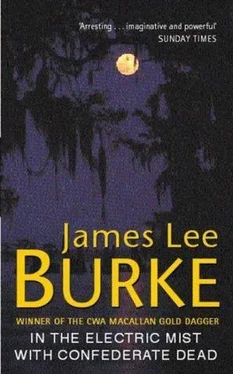Then I found it, on the area news page dated July 27, 1957. A twenty-eight-year-old Negro man by the name of DeWitt Prejean had been arrested in St. Landry Parish, north of Lafayette, for breaking into the home of a white family and threatening the wife with a butcher knife. There was no mention of motivation or intent. In fact, the story was not about his arrest but about his escape. He had been in custody only eleven hours, had not even been formally charged, when two armed men wearing gloves and Halloween masks entered the parish prison at four in the morning, locked the night jailer in the restroom, and took DeWitt Prejean out of a downstairs holding cell.
The story was no more than four column inches.
I rolled the microfilm through the viewer, looking for a follow-up story. If it was there, I didn't find it, and I went through every issue of the Daily Iberian to February 1958.
Every good cop who spends time in a newspaper morgue, particularly in the rural South, knows how certain kinds of news stories were reported or were not reported in the pre-civil-rights era. "The suspect was subdued" usually meant that somebody had had his light switch clicked off with a baton or blackjack. Cases involving incest and child molestation were usually not treated at all. Stories about prisoners dying in custody were little more than obituaries, with a tag line to the effect that an autopsy was pending.
The rape or attempted rape of a white woman by a black man was a more complicated issue, however. The victim's identity was always protected by cops and prosecutors, even to the extent that sometimes the rapist was charged with another crime, one that the judge, if at all possible, would punish as severely as he would rape. But the level of white fear and injury was so collectively intense, the outrage so great, that the local paper would be compelled to report the story in such a way that no one would doubt what really happened, or what the fate of the rapist would be.
Also, the 1957 story in the Iberian had mentioned that DeWitt Prejean had been taken from a holding cell eleven hours after his arrest.
People didn't stay in holding cells eleven hours, particularly in a rural jail where a suspect could be processed into lock-down in twenty minutes.
I left Bootsie a note, then drove to Lafayette and continued on north for another twenty miles into St. Landry Parish and the old jailhouse in Opelousas.
The town had once been the home of James Bowie before he became a wealthy cotton merchant and slave trader in New Orleans. But during the 1950s it acquired another kind of notoriety, namely for its political corruption, an infamous bordello named Margaret's that had operated since the War Between the States, and its gambling halls, which were owned or controlled by the sheriff and which were sometimes raided by the state police when a legislative faction in Baton Rouge wanted to force a change in the parish representatives' vote.
I parked my truck at the back of the courthouse square, right next to the brick shell of the old jail, whose roof had caved in on top of the cast-iron tank, perforated with small square holes, that had served as the lock-down area. As I walked under the live oaks toward the courthouse entrance, I looked through the jail's glassless windows at the mounds of soft, crumbled brick on the floor, the litter of moldy paper, and wondered where the two gloved men in Halloween masks had burst inside and what dark design they had planned for the Negro prisoner DeWitt Prejean.
I got nowhere at the courthouse. The man who had been sheriff during the fifties was dead, and no one now in the sheriff's department remembered the case or the escape; in fact, I couldn't even find a record of DeWitt Prejean's arrest.
"It happened. I didn't make it up," I said to the sheriff, who was in his late thirties. "I found the account in a 1957 issue of the Daily Iberian."
"That might be," he answered. He wore his hair in a military crewcut and his jaws were freshly shaved. He was trying to be polite, but the light of interest kept fading from his eyes. "But they didn't always keep good records back then. Maybe some things happened that people don't want to remember, too, you know what I mean?"
"No."
He twirled a pencil around on his desk blotter.
"Go talk to Mr. Ben. That is, if you want to," he said. "That's Mr. Ben Hebert. He was the jailer here for thirty years."
"Was he the jailer in 1957?"
"Yeah, he probably was."
"You don't sound enthusiastic."
He rubbed the calluses on his hands without looking up at me.
"Put it this way," he said. "His only son ended up in Angola, his wife refused to see him on her deathbed, and there're still some black people who cross the street when they see him coming. Does that help form a picture for you?"
I left the courthouse and went to the local newspaper to look for a follow-up story on the jailbreak. There was none. Twenty minutes later I found the old jailer on the gallery of his weathered wood-frame home across from a Popeye's fastfood restaurant. His yard was almost black with shade, carpeted with a wet mat of rotted leaves, his sidewalks inset with tethering rings, cracked and pyramided from the oak roots that twisted under them. The straw chair he sat in seemed about to burst from his huge bulk.
I had to introduce myself twice before he responded. Then he simply said, "What you want?"
"May I sit down, sir?"
His lips were purple with age, his skin covered with brown spots the size of dimes. He breathed loudly, as though he had emphysema.
"I ax you what you want," he said.
"I wondered if you remembered a black man by the name of DeWitt Prejean."
He looked at me carefully. His eyes were clear-blue, liquid, elongated, red along the rims.
"A nigger, you say?" he asked.
"That's right."
"Yeah, I remember that sonofabitch. What about him?"
"Is it all right if I sit down, Mr. Hebert?"
"Why should I give a shit?"
I sat down in the swing. He put a cigarette in his mouth and searched in his shirt pocket for a match while his eyes went up and down my body. Gray hair grew out of his nose and on the back of his thick neck.
"Were you on duty the night somebody broke him out of jail?" I said.
"I was the jailer. A jailer don't work nights. You hire a man for that."
"Do you remember what that fellow was charged with?"
"He wasn't charged with nothing. It never got to that."
"I wonder why he was still in a holding cell eleven hours after he was arrested."
"They busted him out of the tank."
"Not according to the newspaper."
"That's why a lot of people use newspaper to wipe their ass with."
"He went into a white woman's home with a butcher knife, did he?"
"Find the nigger and ax him."
"That's what puzzles me. Nobody seems to know what happened to this fellow, and nobody seems to care. Does that make sense to you?"
He puffed on his cigarette. It was wet and splayed when he took it out of his mouth. I waited for him to speak but he didn't.
"Did y'all just close the books on a jailbreak, Mr. Hebert?" I asked.
"I don't remember what they done."
"Was DeWitt Prejean a rapist?"
"He didn't know how to keep his prick in his pants, if that's what you mean."
"You think her husband broke him out?"
"He might have."
I looked into his face and waited.
"That is, if he could," he said. "He was a cripple-man. He got shot up in the war."
"Could I talk to him?"
He tipped his cigarette into an ashtray and looked out toward the bright glare of sunlight on the edge of his yard. Across the street black people were going in and out of the Popeye's restaurant.
"Talk to him all you want. He's in the cemetery, out by the tracks east of town," he said.
Читать дальше












